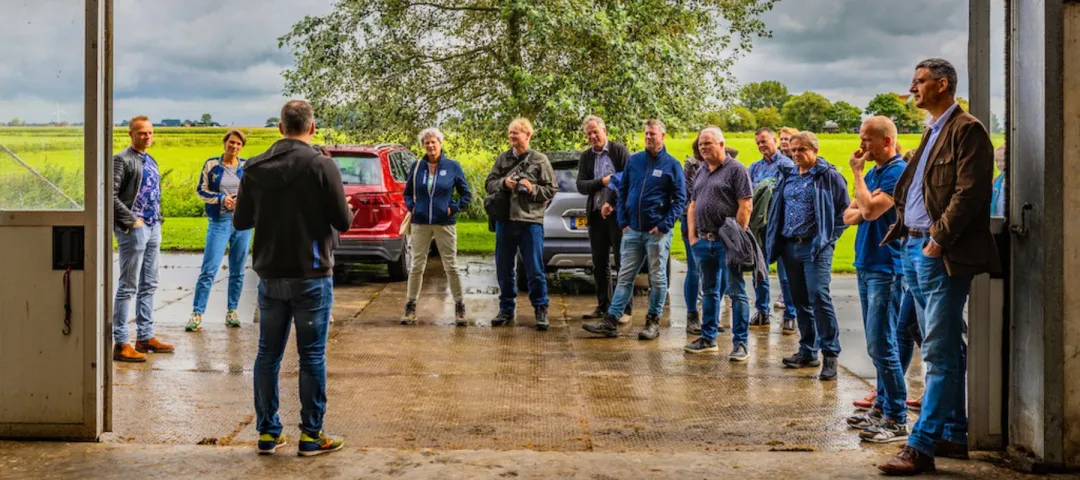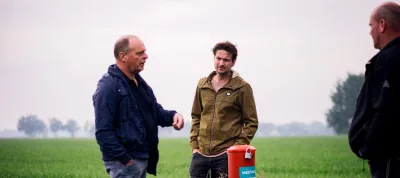General information
RDP Priority
- P2. Competitiveness
RDP Focus Area
- 2A: Farm’s performance, restructuring & modernisation
RDP Measure
- M16: Cooperation
Beneficiary type
- Operational group
Summary
Protecting soil and water quality in the Netherlands is sometimes challenging due to conflicting interests that complicate efforts to achieve cohesive environmental policies. The situation underscores the need for adaptive, integrated, and territorial area-based approaches to soil and water protection.
EU farmers can be resistant to water quality targets and related rules in a conventional context. Area-based approaches offer a way forward. A Dutch EIP Operational Group (OG) focused on these issues by coordinating area and evidence-based approaches. New methodologies and tools were applied, evaluated, and refined in four sub-areas of the Limburg region.
Results show here that one key to achieving more sustainable agriculture through nature and environmental goals lies in grassroots movement and local support. The pilot demonstrated that farmers and local stakeholders take initiative and achieve results, even in challenging circumstances. By providing farmers and local stakeholders with space, time, and resources, much more can be accomplished.
Results
The following farm-based products for water and soil health were delivered:
- four strategic area plans.
- 30 business development plans for farmers based on evidence from measurements (e.g. mineral nitrogen).
- demonstrations of innovative agricultural practices.
- a toolbox of inspiring tools, including guidance for area planning, an implementation strategy, a role-playing game, joint fact-finding methods, and budget tools covering multi-years and multi-funds.
- area networking meetings.
A ‘journey planner’ was developed in which an area-based process is described using the metaphor of a journey. This planner helps to set up an area-specific approach and provides guidance on which steps, methods and tools may be useful, both before and during the process.
Keywords
Resources
Documents
Links
Context
Area-based approaches and cooperation frameworks play important roles in protecting soil and water in rural Europe. Strategic support can help stakeholders share resources and expertise, thereby enhancing the efficacy of conservation practices. This cooperative dynamic fosters community engagement, which is helpful for implementing nature-based solutions that support soil resilience and improve water resource management.
Area-oriented approaches can also enable tailored interventions that better consider the unique ecological contexts of rural regions. Therefore, fostering cooperation at local and regional levels between farmers, policymakers, and researchers enables comprehensive long-term solutions to develop.
Such stakeholder experiences can provide crucial evidence to help optimise public funds from the Common Agricultural Policy (CAP). Managing authorities can gain better understanding of the policy's successes and issues affecting uptake of funding by appreciating the insights and perceptions of farmers, environmentalists, and local communities. Evidence from stakeholder experiences is essential for ensuring that public funds are used efficiently within the CAP framework.
Protecting soil and water quality in the Netherlands is sometimes challenging due to conflicting interests. Stakeholders may often prefer the status quo, and this divergence can complicate efforts to achieve cohesive environmental policies. The situation underscores the need for adaptive and integrated approaches to soil and water protection.
A Dutch EIP OG focused on these issues by coordinating area and evidence-based approaches. A critical mass of information was collated from OG members including farmers, municipalities, water boards, agricultural cooperatives, and regional policy makers, as well as the Ministry of Agriculture, Land Registry and Mapping Agency.
Objectives
OG aims set out to increase:
- cooperation within areas between farmers, municipalities, waterboards/managers, agricultural collectives, etc. to communicate better and work more efficiently on sustainability goals.
- exchange of ideas between areas about water management in dry areas and nitrogen reduction.
- joint assessments of facts and dialogue.
Specific purposes included:
- producing guidelines and usable tools and formats to successfully achieve an area-oriented benefit and cooperation for achieving soil and water goals.
- providing governments with insight on options for strengthening CAP implementation mechanisms for water management in dry areas and nitrogen reduction.
- promoting possibilities for ‘whole-farm’ approaches via CAP support opportunities packaged in flexible, user-friendly synergetic combinations that sustain soil nutrients and reduce leach risks affecting surface water.
Activities
Four parts of the Limburg region project areas were identified for tailored activities, and these four areas were also networked to exchange and compare findings. Project costs involved funding work in (and across) these four sub-regions, including:
- monthly meetings with representatives of the four project areas to exchange ideas and solutions to obstacles, as well as input on the developing formats and roadmap.
- developing formats, tools and methodologies to make plans for each area and the business of farmers in that area, both including budget formats.
- four larger meetings with each project area and representatives of the provincial policy makers, water board policy makers and national policy makers. The goal was to exchange information about the process between the project areas and exchange knowledge between practice and policy.
- facilitating a workshop for over 200 people based on a role-playing simulation game developed by the project for advancing water and soil health.
- several knowledge-transfer interviews with stakeholders of other areas about their experiences and approaches.
- communicating findings through regular newsletters, video, and participating in meetings with the policy makers.
Main results
The following farm-based products for water and soil health were delivered:
- four strategic area plans.
- 30 business development plans for farmers based on evidence from measurements (e.g. mineral nitrogen).
- area meetings.
- demonstrations of innovative agricultural practices.
- a toolbox of inspiring tools including guidance for area planning, an implementation strategy, role-playing simulation game, joint fact-finding methods, and budget tools covering multi-years and multi-funds.
A ‘journey planner’ was developed in which an area-based process is described using the metaphor of a journey. This planner helps to set up an area-specific approach and provides guidance on which steps, methods and tools may be useful, both before and during the process.
Key lessons
25 lessons learned were recorded under three headings:
- put people first and invest in relationships.
- do not prescribe fixed steps, but create space for your own approach, pace and cooperation in an area.
- momentum gets a better start when government takes a facilitating position.
Other points to note include:
- area-based approaches to water and soil health emphasise the integration of diverse management practices for optimal outcomes.
- one critical lesson is the effectiveness of combining conservation techniques, such as crop rotation and cover cropping, to enhance overall soil health and water balance.
- the role of local context is important in shaping management strategies. Adaptation to specific environmental conditions ensures that interventions are tailored to address unique challenges faced by different watersheds, thereby enhancing their sustainability.
- stakeholder engagement is equally key to success. Involving local communities in decision-making fosters ownership and commitment to sustainable practices, ultimately leading to more resilient water and soil health systems.
"The water market was truly a great start to our project. More than 80 people attended. Not only were there good, fair conversations, but follow-up actions were also initiated. Everyone could find the organisation or specialist they were looking for, based on their interests or the issues at their property. They really felt they were being taken seriously."
"We took the watershed of two streams and created clusters of farmers who already knew each other well. Because if you choose an area not based on natural characteristics, it doesn’t automatically feel like a cohesive area."
"If regional goals are not location-specific or are more qualitative in nature, allow for flexibility. This way, there is room for further exploration of solutions during the implementation."
Contacts
Elma Haakmeester


